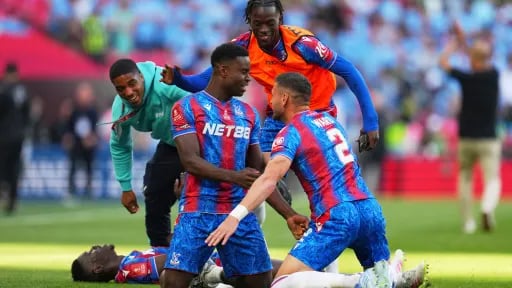Europe... or not? John Textor faces a strategic dilemma with Crystal Palace
Crystal Palace in ambush... but an uncertain future
FOOTBALL
par Louis emmanuel
6/8/20253 min read


As Crystal Palace finishes the 2024–2025 Premier League season on a high note, the dream of European qualification feels within reach. With an exciting style of play, a rising generation of talent, and promising results, the Eagles are eyeing Europe. But behind the sporting success lies a significant threat: John Textor’s multi-club ownership and UEFA’s strict regulations.
John Textor’s Expanding Empire Under Scrutiny
American businessman John Textor is the majority shareholder of Olympique Lyonnais and holds significant stakes in several other clubs around the world: Botafogo (Brazil), RWD Molenbeek (Belgium), and Crystal Palace (England). This global football network allows him to optimize resources, transfers, and visibility across his teams.
However, this multi-club structure clashes with UEFA’s rules, particularly regarding European competitions, where two clubs owned or controlled by the same entity cannot compete in the same tournament due to conflicts of interest.
A Direct Threat to Palace and Lyon’s European Hopes
With Lyon battling for a European spot through the Coupe de France and Crystal Palace pushing into the Premier League’s top 7, both clubs could qualify for UEFA tournaments—only for one to be disqualified.
UEFA has reaffirmed its stance: if two clubs controlled by the same person qualify for the same European competition, only one will be allowed to participate.
Priority will be given based on domestic performance. This means the lower-performing club would be excluded—a scenario Textor is urgently trying to avoid.
Structural Solutions: Reducing Influence or Diluting Control
To navigate this issue, several legal and strategic solutions are being explored. One approach is for Textor to reduce his stake in Crystal Palace, where he currently owns about 45%, making it easier to argue that he does not have “effective control,” as required by UEFA guidelines.
But this option demands a fast and legally secure restructuring, and time is running out before UEFA finalizes entries for its tournaments.
Another possibility is to assign separate management rights to distinct entities, or involve more shareholders to dilute Textor’s direct influence. This model has been tested before, notably by Red Bull with RB Leipzig and RB Salzburg, and by the City Football Group.
Pressure Mounts on Both Sides of the Channel
At Lyon, tension is rising. After a disastrous start to the season, OL staged a remarkable comeback under Pierre Sage, reigniting hopes of European football. But all that effort could be in vain if the Textor issue isn’t resolved in time.
At Crystal Palace, the surge in form—fueled by stars like Eberechi Eze and Michael Olise—has brought renewed optimism. But without UEFA approval, the club’s ambitions could come crashing down.
UEFA Determined to Uphold Competitive Integrity
With multi-club ownership becoming more common, UEFA is determined to protect the integrity of its competitions. The Textor case could become a precedent-setting moment, raising serious questions about the future of multi-club models.
UEFA president Aleksander Čeferin has made clear that stricter enforcement is on the horizon, aimed at preventing manipulation or indirect influence between clubs under the same ownership umbrella.
A Race Against the Clock
As the season concludes and national standings are finalized, UEFA must soon validate participants for the 2025–2026 competitions. John Textor will need to provide credible and compliant solutions—or risk seeing one of his clubs excluded from Europe.
Legal teams on both sides of the Atlantic are working feverishly to convince UEFA before it’s too late.
The Future of Eagle Football Hangs in the Balance
Textor’s Eagle Football project, designed to create synergy between clubs across continents, now finds itself at a crossroads. If this case ends in his favor, it could pave the way for more investors to adopt similar models. If not, it may serve as a roadblock to the rise of football conglomerates.
The future of Crystal Palace, Olympique Lyonnais, and the entire Eagle Football model hinges on a delicate legal, economic, and political balancing act.
